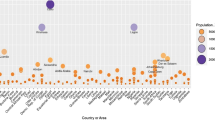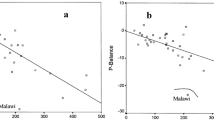Abstract
Climate change impacts on African human settlements arise from a number of climate change-related causes, notably sea level changes, impacts on water resources, extreme weather events, food security, increased health risks from vector home diseases, and temperature-related morbidity in urban environments.
Some coastlines and river deltas of Africa have densely populated low-lying areas, which would be affected by a rise in sea level. Other coastal settlements will be subjected to increased coastal erosion. Recent flooding in East Africa highlighted the vulnerability of flood plain settlements and the need to develop adaptive strategies for extreme weather events management and mitigation. In the semi arid and arid zones many settlements are associated with inland drainage water sources. Increases in drought will enhance water supply related vulnerabilities. Inter-basin and international water transfers raise the need for adequate legal frameworks that ensure equity among participating nations.
Similarly, water supply and irrigation reservoirs in seasonal river catchments might fail, leading to poor sanitation in urban areas as well as food shortage. Hydroelectric power generation could be restricted in drought periods, and where it is a major contributor to the energy budget, reduced power generation could lead to a multiplicity of other impacts. States are advised to develop other sources of renewable energy.
Temperature changes will lead to altered distribution of disease vectors such as mosquitoes, making settlements currently free of vector borne diseases vulnerable. Rapid breeding of the housefly could create a menace associated with enteric disorders, especially in conditions of poor sanitation.
The dry savannahs of Africa are projected as possible future food deficit areas. Recurrent crop failures would lead to transmigration into urban areas. Pastoralists are likely to undertake more trans-boundary migrations and probably come into conflict with settled communities.
Adaptive measures will involve methods of coastal defences (where applicable), a critical review of the energy sector, both regionally and nationally, a rigorous adherence to city hygiene procedures, an informed agricultural industry that is capable of adapting to changing climate in terms of cropping strategies, and innovations in environment design to maximise human comfort at minimum energy expenditure. In the savannah and arid areas water resource management systems will be needed to optimise water resource use and interstate co-operation where such resources are shared.
Climate change issues discussed here raise the need for state support for more research and education in impacts of climate change on human settlements in Africa.
Similar content being viewed by others
References
Anon (1992). ‘Pastoralists' progress: the future for the Sahel.’ Spore 39: 1-4.
Caponera, D. A. 1996. ‘Conflicts over international river basins in Africa, the Middle East and Asia.’ Review of European Community and International Environmental Law 5(2): 97-106.
Cousins, B. 1996. ‘Conflict management for multiple resource users in pastoralist and agro-pastoralist con texts.’ IDS Bulletin 27(3): 41-54.
De Lattre, A. 1988. ‘What future for the Sahel?’ OECD Observer 153: 19-21.
Hulme M 1995 (Ed). Climate change and Southern Africa: an exploration of some potential impacts and implications in the SADC region. Climate Research Unit, UEA and WWF International. 103 pp.
Jallow, B. P., M. K.A. Burrow and S.P. Leatherman. 1996. ‘Vulnerability of the coastal zone of the Gambia to sea level rise and development of response strategies and adaptation options’ Climate Research 6(2).
Lado, C. 1995. ‘Some aspects of food security and social stress in the African arid and semi-arid environments.’ Indonesian Journal of Geography 27(69): 31-49.
Magadza, C. H. D. 1995. ‘Climate change: some multiple impacts in Southern Africa.’ Food Policy; 19(2):p 165-191.
Magadza, C.H.D. 1984. ‘An analysis of siltation rates in Zimbabwe.’ Zimbabwe Science News 18(5&6): 63-64.
Magadza, C.H.D. & E.J. Dhlomo. 1996. ‘Wet Season incidence of coliform bacteria in the inshore waters of L. Kariba.’ Lake and Reservoir: Research and Management. Vol. 2: 89-96
McMichael, A.J, Haines A, R. Slooff, and S. Kovats (Ed) 1996. Climate Change and Human Health. WHO. Geneva 297pp
Microsoft Encarter7 97. World Atlas
Mimura N., Tsutsui J., Ichinose T., Kato H and K. Sakaki. ‘Impacts on Infrastructure and Economic Systems.’ In Nishioka S and H. Harasawa (Eds) 1998. Global Warming: The Potential Impact on Japan. Springer. 244pp.
Reibsame, W.E., K.M. Strzepek, J.L. Wescoat, J.R. Perrit, G.L. Gail, J. Jacobs, R. Leichenko, C. Magadza, H. Phien, B.J. Urbiztondo, P. Restrepo, W.R. Rose, M. Saleh, L.H. Ti, C. Tucci, and D. Yates. 1995. ‘Complex River Basins.’ In Climate changes, International impacts and implications. Strzepek, K.M. and J.B. Smith. (Ed) CUP.
Salam, Abdus Muhammad. 1991. Science, technology and science education in development of the South. Third World Academy of Sciences. 381pp.
Strzepek, K.K., Yates D.N. and D.E.D El Quosy. 1996. ‘Vulnerability assessment of water resources in Egypt to climate change in the Nile Basin.’ In Dixon, Robert, K., Sandra Guill, Francis X. Mkanda and Ihor Hlohowskyj. (Ed), 1996. Vulnerability and adaptation of African Ecosystems to global climate change. Climate Research 6(2) CR Special 1996191x
Watson, R.T., Zinyowera, M.C., and R.H. Moss. (Ed) Regional Impacts of Climate Change; an assessment of vulnerability. CUP.517 pp.
World, B. (1996). Toward environmentally sustainable development in sub-Saharan Africa: a World Bank agenda.
Author information
Authors and Affiliations
Rights and permissions
About this article
Cite this article
Magadza, C. Climate Change Impacts and Human Settlements in Africa: Prospects for Adaptation. Environ Monit Assess 61, 193–205 (2000). https://doi.org/10.1023/A:1006355210516
Issue Date:
DOI: https://doi.org/10.1023/A:1006355210516




